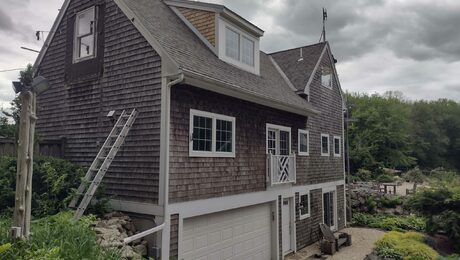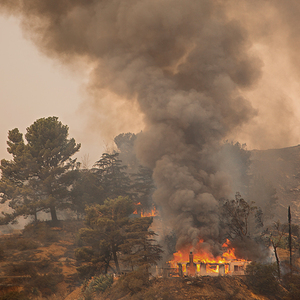I’m sure this may have been discussed elsewhere but I can’t find it if so. What in the blazes is going on with the cost of building supplies? In my area drywall 4×8 is up to $7, box of drywall screws $20, OSB that used to be $6.99 now goes for $19, plywood costs soaring, electric wire creeping up in price like gas is…..what the?
I heard it was cuz we’re shipping it all over to Iraq? That can’t possibly be true, or is it? I mean, we didn’t do that much damage to cause this much of a spike I don’t think. Or am I just way off out in left field?



















Replies
Screws and nails are up because the cost of steel is way up. As I understand it, China is buying up scrap steel in a big way since their economy is growing at a phenomenal pace.
Plywood and OSB are up because of supply and demand. The line about the government sending huge shipments over to Iraq isn't true. They did send some last year, but it wasn't enough to cause the prices we're seeing.
Unfortunately there's no end in sight. I wouldn't be surrised if stuff went quite a bit higher this summer.
A Smith & Wesson beats four aces
It appears that raw goods commodity prices have peaked and are now slipping back. China is trying to put the breaks on their runaway growth. Hard to believe there is a shortage of plywood as I sat at a railroad crossing where 4 UP engines were pulling at least 200 cars of plywood. But with interest rates still low people are continuing to build new houses and additions.
"It appears that raw goods commodity prices have peaked and are now slipping back.
I hadn't heard that, but it would certainly be good news.
How did you come by that info? Last I heard they were expecting steel prices to go up 10% a month through the summer.Do infants enjoy infancy as much as adults enjoy adultery?
Boss Hog wrote:
I hadn't heard that, but it would certainly be good news.
How did you come by that info? Last I heard they were expecting steel prices to go up 10% a month through the summer.
CNBC and following the markets. Of course, retail and wholesale prices may not always follow eachother, and there could be a delay in the price recession of a few months.
All I know is that plywood went up $2 a sheet between when I priced the project and I picked up the materials. :(
Copper has started coming back down (slowly) since jumping higher than I've ever seen it before.
Unfortunately there's no end in sight. I wouldn't be surrised if stuff went quite a bit higher this summer.
Yeah like freaking GAS. Just heard today that barrel of oil is up to 40 freaking dollars now, supplies are tight, demand high. I remember when a gal was around $1.30, wasn't that long ago, what about 2 or 2.5yrs ago. We're hitting $1.90 here now. And last month OPEC cuts production and has all kinds of excuses for doing so.
Then bldg materials are jumping up but no ones salaries or pay is going up. I believe in supply side economics, but there is a point when you can do yourself in. If bldg materials keep going up and peoples pay aren't going up with it, then your cust base goes down. Plus we have to charge more which limits who can pay for the work. God help us, you're right, I don't see an end either. Why does everything always have to go UP in price? Why can't something that cost $10 be $10 ten yrs from now? Same material, same this, same that. Sigh, I digress. I"m just tired of prices rising all the time. For once you'd think something could come down.
"Then bldg materials are jumping up but no ones salaries or pay is going up. "
Where were you when OSB went down to $4.75 a sheet a few years back? Did your salary go down when OSB prices went down?
"If bldg materials keep going up and peoples pay aren't going up with it, then your cust base goes down."
Exactly. Once the demand goes down, so do prices. That's how supply and demand work.
"Why does everything always have to go UP in price?"
Inflation. Your wages go up on a fairly regular basis, don't they?An ounce of mother is worth a pound of clergy. -- Spanish proverb
All I'm saying is....why IS there inflation to begin with? I mean, why is it a dollar today is more than a dollar tomorrow? I mean, 12" = 1'. Why does money have to be any different and so fluctuating? That's my only point.
Did my salary go down when materials cost went down? of course not. Yes I understand the concept of the supply costs coming back down once the pool of customers has dwindled to the few left who can afford it but to me if costs stayed stable and if you didn't intentionally limit your cust base by pricing your materials so high in the first place then you wouldn't need this cycle. Make a dollar today the same value as tomorrow.
Ok, I've put out my pipe now, no more utopian pipe dreams.
Edited 5/5/2004 11:12 pm ET by Pyrotechie
Why is there inflation? By and large it is fueled by that same magic ingredient that makes capitalism work - greed. The owners hope to squeeze a little more profit out whenever possible and the workers try to get a little more in wages in each bargaining round. If productivity were to raise at the same level as wages/prices then there wouldn't be any inflation. However, we all want more...
There was pretty low inflation, overall, in the 1800's, deflation in the 1930's a pretty big jump after WWII, and a really big inflation jump in the 1970's - if I remember correctly. There was some fear during this last recession that there would really be deflation (which occurred in Japan) but I could never really find out why a little deflation would be such a catastrophe as it was made out to be.
I just ran across a little inflation calculator that is kind of fun. There is also an explanation of the various measures of inflation and how they differ. The calculator says that for the Consumer Price Index, my first professional salary of $600/month in 1964 would work out to be equivalent to about $3560/month today (without taking into account taxes, of course.
Find out if you are really making more than you were when you started...:
http://eh.net/hmit/compare/index.php
Ok...
Here goes with my Amateur Economist analysis of inflation.
Inflation is caused/results from/is proportional to moneys being made by those who don't produce.
Banks charging interest
stockholders getting dividends
government waste
corporate greed
Top heavy redundant management.
Corporate welfare
insane entertainment salaries
the guy a few cubicles down who is next to useless
the bosses kid/nephew/girlfriend/churchbuddy who cant find his asss with both hands
welfare for the poor
in short anyone who gets paid for doing nothing useful.
All of us who do work and produce, need to produce enough to cover those who don't.
It is as simple as a skimming operation.
3% of the population control ~90% of the wealth.
But do they do 90% of the work???
Not coincidentally the inflation rate is ~3%
The main thing these people work at is keeping the money flowing thier way.
Why do you think lawyers and politicians and stock brokers and accountants....are paid so much?
Because they keep the money flowing upward.
Spikes in prices happen when someone gets a little to greedy and wants a quick profit.
so they boost thier price
and because this effects the next guys profit, he does the same.
it ripples staight down the food chain until the the only ones left are the working class.
we tightern our belts and work a little harder and ask for a raise.
Uh Oh!!! we just caused another ripple.....
OK Pick away!!
Mr T
Happiness is a cold wet nose
Life is is never to busy to stop and pet the Doggies!!
Whoa, Mr T.....now I"m really depressed. We're doomed LOL
could never really find out why a little deflation would be such a catastrophe as it was made out to be.
The reason is that deflation makes assets (collateral, muni bonds, etc.) worth less than their face value. Thus, they would have to have a negative interest rate (which is like negative distance, it can be imagined, just not measured). The Japanese "Fed" reduced rates to 0%, but since there was deflation, that actually worked out to be a "cost" of about 2-2.5% (so your bond 'increased' in worth from, say, 1000yen to 890yen--not good economics).
We say a little of this when mortgage rates dropped from double-digit values. Every thing financed (or 'leveraged' to use the term-of-art then) had less value than before. This fueled the failure of many S&Ls.
The worst thing about deflation is that almost any action tends to be wrong. The government cannot manipulate interest rates below zero. The marketplace can't really 'spend' its way out of the mess. About the only cure is time, and letting the natural pendulum of things swing back to 'normal.' Deflation can create a buyer's market, but it is a market buying as fire sales, recieverships, and bankruptcies.Occupational hazard of my occupation not being around (sorry Bubba)
>>....why IS there inflation to begin with? I mean, why is it a dollar today is more than a dollar tomorrow? I mean, 12" = 1'. Why does money have to be any different and so fluctuating?
Inflation is created when the ratio of available dollars to the goods and services that these dollars buy increases. When the supply of anything increases relative to the demand for it, the value of that anything decreases. Money itself is no different. As the value of dollars fall, so does the dollars purchasing power. Inflation.
The process of the creation of new dollars occurs only through the "monetization" process of the Federal Reserve. The FR monetizes debt usually by buying US bonds from the treasury, and paying by writing a check from its "magic checkbook" (it literally spends money that it doesn't have) which is cashed at a Federal Reserve Bank. This new cash that has been created out of thin air then enters the economy through normal banking operations. It is actually legal counterfitting, and is loosely referred to as "printing money".
If the Fed creates money faster than the economy grows, which means there will be a cumulative surplus of cash in circulation, there is inflation. Inflation manifests itself in higher prices for the same amount of goods or services.(all othere things being equal)
If the Fed creates money slower than the demand for cash then there is deflation. Inflation manifests itself in LOWER prices for the same goods and services (all other things being equal)
This instability of the value of the dollar is destructive. If there is inflation, the folks who borrow money, will over time be paying back their debt in depreciated dollars, which cheats creditors.
OTOH, if there is deflation, the folks who LEND the money have the advantage, because they will be repaid in stronger or appreciating dollars than the ones they lent out. This instability, inflation and deflation, introduces more risk into the system than should naturally be needed, than if we had money that could not be created by men, such as gold.
A stable dollar value is better for the economy as a whole, which translates into more wealth creation and a rising living standard for all.
The Federal Reserve has done a lousy job of protecting the value of the dollar. The value of countless pools of private savings has been greatly reduced, especially since 1971. This debauching of the currency is really simply theft, by the Federal government - it is a "stealth tax".
The temptation of the Federal Reserve is to juice the money supply for political reasons. With a commodity money, such as gold, this would not be possible.
Edited 5/6/2004 7:39 pm ET by CashB
Inflation has alot to do with the time element. People wanting things now as opposed to tomorrow means they are willing to pay more. And buying things now leads to things like interest. The more people are willing to borrow, the higher goes interest, and the more inflation we experience. Because someone wants that dollar in your hand, they are willing to pay you a few percent more in interest to hold it for a year. To you, that dollar has become $1.03, but to them it is $0.97 because they had to pay the interest. A modern economy is made up of several inflation generating components, mostly fueled by long term major capital expenditures such as the industrial base and home mortages. We are in a bizarre period right now where an excess of cash is available that exceeds the the normal demand, hence very low interest rates on the housing sector. That money is coming from the office and industrial sectors which are overcapitalized at the moment. But conversely, that cheap money has led to higher unit prices in the housing sector. Look at it this way. Three years ago at 7% you might be able to afford a $250K house. At 5% today that same monthly payment would buy you a $300K house. Since most people decide what they can afford based on the monthly payment, they are closing on houses at the asking price rather than making a lower offer. This acts to drive the price of houses up where demand is high. Competing with existing houses though are newly built houses. So people start to say, hey, why not build a house for $250K instead of buying one for $300K. Once enough people decide to do that, Joe Blow builder starts to raise his price based on what people are willing to pay since there are only so many builders and probably only a limited time when this long term cheap money will be available. Why build a house for the Schmo's for $250K when the Schmuck's are willing to pay $275K. And if you get enough people building houses, and there is only so much plywood at the lumber yard, then the plywood guy figures why should he sell 1/2" OSB for $15 a sheet when an overcommitted contractor is willing to pay $18 a sheet in order to finish the job this summer.
I have friend back in Ohio who is in that squeeze right now. All the builders are booked solid and are pretty much naming a price as opposed to competing with other builders. My friend is looking at paying 20% more to get his house built this summer as opposed to a year ago when he was buying the land and pricing different plans. To some degree wages could fluctuate with this market as a GC might find himself paying more for the subs just to guarantee they are working on his house and not his competitor's house. But it all depends on whether other trademen are willing to move into the area to bring wages back down.
Screws and nails are up because the cost of steel is way up.
Went yesterday to get air nails. Price has almost doubled in 3 weeks..
Life is not a journey to the grave with the intention of arriving safely in a pretty and well preserved body, but rather to skid in broadside, thoroughly used up, totally worn out, and loudly proclaiming.... WOW!!! What a Ride!
Various reasons like China and Iraq true fior part of it.
Gas cost increase means that shipping and delivery costs have gone up
Insurance companies lost money for a couple of years so insurance costs have goone up for everyone and everything. That gets aded in on the bottom line.
I think aLSO THAT A LOT OF IT IS PENT UP DEMAND/PRICING PRESURE.
A survey of CEOs of many US corporatuions in late 2002 reported that these companies were planning a price increase during 2003 on the average of 7%.
That never happened. The economic slowdown that followed 911 kept eveeryone too nervous to push the prices up so they pinched their pennies and sucked it in. But now that they have held things tight for three years, and are facing increased fuel and insurance charges, they have no choice but to increase prices to be there tomorrow too.
Some featherbedding? Sure.
but another round of inflation is coming.
Welcome to the
Taunton University of Knowledge FHB Campus at Breaktime.
where ...
Excellence is its own reward!
but another round of inflation is coming.
Yeah, I"m afraid you're prob right. Yeah I know inflation isn't necessarily a bad thing because it plays a major role in the economy and it can either keep an economy steady, or make it whacked for a while. I dunno, though, I look at everything and the costs just seem to be climbing for everything. . But if inflation is going to rise, then pay and salaries need to rise at the same pace as far as I'm concerned. I gotta family of 4 here I gotta feed, cloth, and transport the same as anyone else; I'd like to be able to still do those things.
Why does everything always have to go UP in price? Why can't something that cost $10 be $10 ten yrs from now?
Some things stay the same, some go down.
Do you think about it every time you turn on your 30"+ TV that cost less than a 19" did ten years ago?
If gasoline had kept pace with inflation over the last 10 or 20 years, we'd be paying how many $ a gallon?
Building mat prices fluctuate, and the excuses are usually pretty limp.
The big drywall shortage vanished, the price went down.
Ply will come down, but probably not where it was.
The tree huggers make it more difficult daily to drill for oil or gas, cut a tree or build a refinery or factory.
A lot of our manufacturing moved to China, and now the $ they earned have turned around to buy the things we are now complaining about.
20 years ago, a picture of any Chinese city had a zillion Chinese on bicycles, now they're in cars. Steel and oil, gone to China.
Raw materials are going up, finished goods follow.
Joe H
Edited 5/5/2004 11:54 pm ET by JoeH
As a general rule, those who are still working can increase wages and income to follow inflation ( maybe a year behind it though) while those who are in business and setting prices and know what is ahppening can keep pace with inflation, but it is those on fixed incomes like the retired who suffer from inflation. The retirees got hit hard in the seventies/early eighties. Reagan called inflation the cruelist tax of all because of this. Social security was adjusteed to allow for cost of loving increases based on the govt recognized inflation rate. Myself, I don't believe that it recognizes all the inflation that exists.
Welcome to the Taunton University of Knowledge FHB Campus at Breaktime. where ... Excellence is its own reward!
"Reagan called inflation the cruelist tax of all because of this. Social security was adjusteed to allow for cost of loving increases based on the govt recognized inflation rate. Myself, I don't believe that it recognizes all the inflation that exists."
Absolutely not.
Because there are so many variables to anones buying patterns that while one person might see very high inflation the next might not see any.
But the two biggest factors in a persons living expenses are substitutions and expectations.
Stitutions work both ways. If the price of beef goes from $3.50 to $15 has you food bill gone up that much or do you eat more chicken?
And Look at the first TV that you bought. Maybe a 17" B&W. Is that the same model that you are buying today or has it been stituted with a 27 color or maybe even a big screen. You might be paying more or less than you did for the oringal one.
And for expecation just look at the items that are considered as "standard" in to days lifestyle that your parents did think of as standard or even available to them. Central air, cell phones, and computes are a few.
A couple of reasons that people haven't listed:
1) Many of these items are made off-shore and have had punitive tarrifs applies. Even if your brand was made in the USA, prices will always rise to the common denominator.
2) The US dollar sank like a stone against other currencies because of the deficit: it buys less now.
Phill Giles
The Unionville Woodwright
Unionville, Ontario
1) Many of these items are made off-shore and have had punitive tarrifs applies. Even if your brand was made in the USA, prices will always rise to the common denominator.
Hmmm, indeed, good point. Plus, even for things which are made in USA, they often may have components NOT made in the USA for which those component costs rise also. Oh well. My orig post was prob more rhetorical than anything. I mean I realize inflation is a pawn in this game you can't do without. I don't think I could ever really follow an economics class. I just use my head and plain common sense. All these other mitigating factors that affect prices of things sometimes seems ridiculous to me.
Have you seen the price of deck screws? 5.00/lb . And people complain about milk!